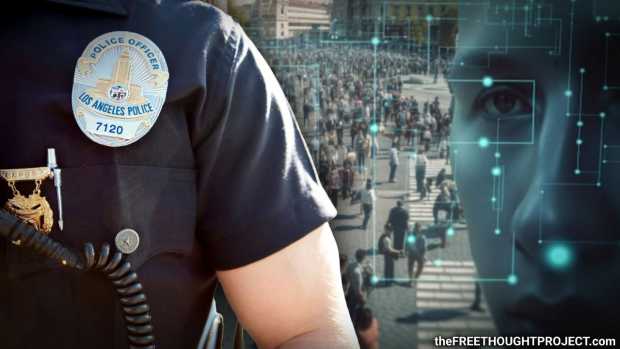
Instead of 'Love thy Neighbor,' Famous Evangelist Encourages Others to Fear and Hate Muslims
Just as no man is a hypocrite in his pleasures, the fears he expresses say more about his true beliefs than do any overt professions of faith. By this measure, the Rev. Franklin Graham is more of an “unbeliever” than candid atheists like Sam Harris or Richard Dawkins, and the Bible he conspicuously wields is little more than a stage prop. Confronted with what he considers the existential threat posed by Islam, Graham turned to the State, rather than the God he worships, for protection.
“For some time I have been saying that Muslim immigration into the United States should be stopped until we can properly vet them or until the war with Islam is over,” Graham declared by way of a Facebook epistle on December 9 defending Donald Trump’s proposal to ban Muslims from the country.
Reciting from a fraudulent survey conducted by the Center for Security Policy – a Pentagon front group headed by febrile war hyena Frank Gaffney – Graham claimed that a majority within America’s minuscule Muslim population seek to be governed according to Sharia law, nearly a third believe that “violence against those who insult Mohammed is acceptable,” and a quarter of that population believe that “violence against America can be justified as part of global jihad.”
“Among males under the age of 45, that number rises to 36 percent,” Graham quavered. “And 29 percent of males under 45 believe that violence against America is justified in order to make Sharia the law of the land. This is frightening.”
Graham found similar cause for fright in the findings of a more reliable survey conducted by the Pew Research Center that eight percent of adult Muslims in the United States believed that violence in the name of Islam is “sometimes” or “often” justified.
“Think about it – that’s 144,000 Muslims who openly say without hesitation that violence in the name is Islam is justified!” Graham shrieked. “That’s not `peaceful’ and that’s not a small number – it’s about the size of the entire population of Syracuse, New York!”
Muslims presently constitute less than one percent of the U.S. population. Less than a tithe of that sub-population offered a qualified endorsement of violence in unspecified “circumstances” – which would most likely include self-defense, defense of one’s home and family, and other scenarios that would elicit identical responses from Christians and other non-Muslims. Granted, some American Muslims believe that their religion authorizes them to commit lethal violence against others.
Recommended for You
The same is true of some professed Christians. One specimen of that kind, self-described “warrior for the babies” Robert L. Dear, publicly confessed to religiously inspired murder on the same day that Graham took to his Facebook pulpit to inveigh against Muslims. Also noteworthy is a 2009 Pew survey about religious attitudes toward the use of torture: Sixty-two percent of white, Evangelical Protestants surveyed said that the use of torture is "sometimes" or "often" justified in interrogating terrorist suspects. Significantly, "those who attend religious services at least once a week are much more likely than those who seldom or never attend religious services to take this view," Pew pointed out.
American Muslims are badly outnumbered by religious zealots who approve of torture and support, in large numbers, a presidential candidate who believes that the families of accused terrorists should be "taken out." Aren't they the ones who have legitimate cause for concern?
The book Graham believes to be the unalloyed truth describes an ancient battle in which the righteous Israelite Gideon, in compliance with a divine directive, victoriously commanded an army of 300 men against an enemy described to be “as thick as locusts.” On another occasion, a tyrant dispatched a large army to capture the Israelite prophet Elisha. When the city was surrounded by battle-hardened troops, the prophet’s servant panicked. According to the biblical account, Elisha prayed that his companion could see the world the way that he did – and in a moment the young man saw that the hills were filled with angelic warriors and chariots of fire.
“Do not fear,” Elisha advised his servant. “Those who are with us are more than those who were with them.”
For unbelievers, these are myths, rather than history. On the basis of his actions it’s clear that the same can be said of Franklin Graham, who is left palsied with terror by the mere presence of a tiny, marginalized, and powerless minority.
His prescribed course of action in dealing with the Muslim “menace” in our midst is similarly revealing. Rather than reminding his Facebook congregation of Jesus’s promise that the “gates of hell” would not prevail against the Church, or of the assurance provided by the Apostle John that “perfect love casts out fear,” Graham urged them to take counsel from their fears and to pray to the state for protection against their enemies, real or perceived.
Like his father, Franklin Graham frequently preaches of the sacrificial death and miraculous resurrection of Jesus Christ, which constitute the core message of the Christian faith to those who believe. For Christian believers, the reality of Christ’s resurrection changes the way we view everything, including the possibility of martyrdom. This doesn’t abolish the need to attend to practical concerns, including self-defense and the defense of those for whom believers have responsibility. This means that for believers the most practical considerations are those dictated by Christ’s moral teachings, including the duty to love one’s neighbor irrespective of his beliefs or identity.
In his study of ancient Babylon, historian Will Durant described how “the gods … formed the invisible constabulary of the state” in that thoroughly materialistic and status-obsessed society. The typical resident of Babylon, Durant points out, “derived no satisfaction from the idea of personal immortality. His religion was terrestrially practical; when he prayed he asked not for celestial rewards but for earthly goods,” such as profit in business ventures, success in romantic pursuits, and victory in battle.
Facing fears for which his faith provides no remedy, Franklin Graham seeks the protection of the state, rather than taking strength from the promises of his God. He is a Babylonian who “identifies” as a Christian.












